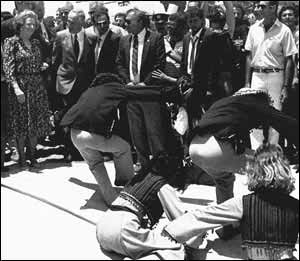|
MARGARET THATCHER TRIBUTE Maggie was a friend of Israel... but caused anger, too | |
ISRAEL's president and prime minister, as well as Britain's Jewish communal leaders, have conveniently glossed over occasions when Baroness Thatcher caused more than a little angst, if not real anger, both at home and in Israel.
Yes, she was - at an early stage of her parliamentary career - appointed president of the Finchley Anglo-Israel Friendship League. And when she was elected as Opposition leader in 1975, a UK diplomat in Jordan questioned her suitability to retain the post as there were Arab "fears and suspicions" that she was a "prisoner of the Zionists". Thatcher went to Israel in 1965, even before it was fashionable for back-bench MPs to travel abroad to familiarise themselves with foreign parts. As she climbed up the rungs of the ministerial and shadow ministerial ladders, she became more knowledgeable about her local and the UK's Jewish community. By the time she became prime minister in 1979, she was not only aware of Jewish issues but also had a good grasp on how to reply to questions, be they on shechita, brit mila, etc. But when Israel attacked Iraq's nuclear reactor at Osirak in 1981, chief among its critics was a certain Margaret Thatcher. She was adamant that Israel had exceeded its right to self-defence, and was not afraid to castigate the Jewish state in public as well as in messages to the-then Israeli premier Menachem Begin, with whom she wanted no truck. Fast forward to 1983 and an innocent looking trip to Tunisia by junior Foreign Office Minister Douglas Hurd became duplicitous. It soon emerged that while there he broke a long-standing taboo and held the first ministerial meeting with Yasser Arafat in days when almost all still considered the PLO man a terrorist. Israel was angry and not without good cause, yet for Thatcher - a "true" friend of Israel - it was not an issue. Three years later, things changed a little for the better. With Shimon Peres and Yitzhak Rabin more prominent in the political hierarchy, she felt less constrained in undertaking an official trip to Israel. The trip went well and for me there was the bonus of being selected to undertake a pre-visit interview with her for the Jewish Telegraph. Much of the interview covered the inevitable issues of improving ties between the two countries, expanding trade links, the arms restrictions, dealing or otherwise with the PLO, then on to Soviet Jewry and antisemitism. By 1988, she had appointed yet another junior minister to the Foreign Office dealing with the Middle East - David Mellor, who was a supporter of the Palestinian cause. He went on an official trip to Israel and while in Gaza, decided to provoke a row over Israel's alleged treatment of Palestinians with an army colonel who had a limited command of English. Mellor's furious demand that it be stopped, and later statement to journalists that the treatment was "an affront to civilised values", was broadcast around the world. It caused an international incident for which Mellor refused point-blank to apologise. Thatcher did the Jewish things with aplomb - a visit to Finchley Synagogue and an address to the Board of Deputies. Numerous Jewish charities too benefited from her attendance and support. She was prepared to meet delegations of senior members of the Jewish community from time to time - though rarely were they able to shift her ideas to another direction or her opinions generally. Thatcher appreciated her Jewish colleagues around her and felt comfortable with them, though. But Sir Keith Joseph, Nigel Lawson and Leon Brittan all resigned, as did another of her loyal supporters in Sir Malcolm Rifkind. Other Jewish colleagues included Sally Oppenheim, Michael Howard and Lord Young. If nothing else, she certainly laid to rest any lingering feeling of antisemitism that may have remained in the post-war Conservative Party. So was she such a good friend to Israel as the tributes from Shimon Peres and Benjamin Netanyahu made her out to be? On balance, it's a much-qualified and only partial "yes". There were just too many missed opportunities to take a slightly different path from that expected by her Foreign Office, which inevitably showed Arabist leanings. And had she acted more independently, would Israel today have been in a better place? Probably yes, as she had a far better relationship with Peres and Rabin in her later years as premier. Was she a friend to the Jews? Most certainly. And she rarely missed an opportunity to show genuine friendship and support. For Israelis the Thatcherism saga is far from over. Indeed, Benjamin Netanyahu was - and remains - wedded to many of her right-wing economic policies.
|
 British Prime Minister Margaret Thatcher (left) and Israeli Premier Shimon Peres (2nd left) watch Israeli folk dancers perform honor of their visit to Ashkelon in Israel on May 26, 1986
British Prime Minister Margaret Thatcher (left) and Israeli Premier Shimon Peres (2nd left) watch Israeli folk dancers perform honor of their visit to Ashkelon in Israel on May 26, 1986